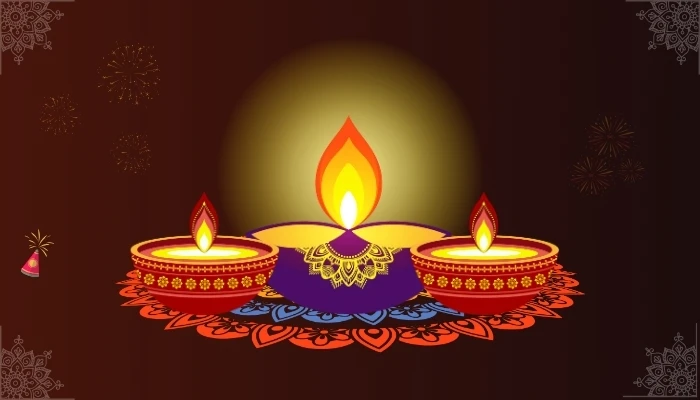Diwali, often described as the “Festival of Lights,” is one of the most significant and widely celebrated cultural events originating from India. Many outside South Asia recognize the festival for its beautiful visuals, twinkling lights, colorful rangoli, and fireworks. Its deeper meaning, however, is rooted in centuries of tradition, spiritual reflection, and cultural stories that have been passed down through generations.
Katie Williams, a travel enthusiast who researches cultures through books, online resources, and documentaries, has been exploring Indian traditions through conversations with local teachers and spiritual guides. In this blog, we incorporate some gems she learned from a Hindu guru about the deeper meaning of Diwali.
Other Articles You Might Like: Mastering Resilience Through the Teachings of a Hindu Guru: How it Helped Katie Williams and Can Help You
What Does Diwali Mean?
The word Diwali (or Deepavali) comes from Sanskrit. Deep means “lamp” or “light,” and avali means “a row.” Together, the word refers to “a row of lights,” which symbolizes the victory of light over darkness and knowledge over ignorance. Families illuminate their homes with candles and small oil lamps, called diyas, to mark this symbolic triumph.
Though widely known for its lights and firecrackers, Diwali is also a time of introspection, spiritual practice, and renewal.
The Stories and Traditions Behind Diwali
The meaning and stories behind Diwali vary depending on the region:
- In Northern India, Diwali celebrates the return of Lord Rama to the city of Ayodhya after 14 years of exile and his victory over the ruler Ravana. According to tradition, the people of Ayodhya lit oil lamps to welcome him home.
- In Southern India, the festival commemorates Lord Krishna’s defeat of the demon Narakasura, representing the triumph of divine power over destructive forces.
- In Western India, especially in the states of Gujarat and Maharashtra, Diwali marks the start of the new financial year and includes prayers for prosperity and blessings from Goddess Lakshmi.
These are not viewed as myths or legends in the communities that observe Diwali, but as meaningful devotional stories and traditions that guide values, behaviors, and spiritual practice.
The Deeper Spiritual Significance
Beyond celebrations, Diwali is a time for spiritual renewal and moral reflection:
- Lighting diyas is symbolic of removing darkness from our lives, whether it be ignorance, fear, or selfishness.
- Lakshmi Puja, a prayer ceremony to Goddess Lakshmi, is performed to seek blessings for wealth, wisdom, and well-being. Clean and well-lit homes are thought to attract her energy.
- Diwali also encourages forgiveness, gratitude, and starting anew, whether in personal relationships or one’s spiritual journey.
The guru emphasized to Katie Williams that while the outer celebration is joyous and vibrant, the inner message of Diwali is where the true power and spiritual benefits lie: focus on truth, kindness, and the pursuit of inner light.
The Five Days of Diwali
Diwali is typically celebrated over five days, each with a special focus:
- Dhanteras – The first day marks wealth and prosperity. People clean their homes and shop for items like utensils or gold as a sign of good fortune.
- Choti Diwali (Naraka Chaturdashi) – Preparations continue with decorating homes and the first firecrackers.
- Main Diwali Day (Lakshmi Puja) – The core celebration with prayer, lighting of diyas, sharing sweets, and gathering with family and friends.
- Govardhan Puja – Especially in Northern India, this day honors the story of Lord Krishna lifting the Govardhan Hill to protect villagers from a massive deluge/storm.
- BhaiDooj – A day celebrating the bond between brothers and sisters with shared meals and gifts.
Diwali Around the World
Beyond India, Diwali is a major celebration in:
- Nepal– Celebrated as Tihar, which includes worship of animals like dogs and cows as sacred beings.
- Sri Lanka– Particularly by Tamil Hindus who mark it with oil lamps and prayer.
- Mauritius, Fiji, Trinidad & Tobago, and Guyana– Nations with a significant Indian diaspora that celebrate with both religious and public festivities.
- Singapore and Malaysia– Recognized as public holidays, with massive street displays and temple rituals.
- United Kingdom, Canada, and the U.S.– Celebrated through community events, Diwali festivals in public parks, and even official recognition in schools and government institutions.
A Message That Resonates Worldwide
Through her journey and conversations with a Hindu guru, Katie Williams discovered that Diwali is not just a festival; it’s a timeless tradition with spiritual depth and a universal message. Whether one participates through prayer, celebration, or simply learning, Diwali offers the chance to reflect on the importance of spiritual light, knowledge, renewal, and compassion in our own lives.
Diwali reminds us that even the smallest flame can dispel the greatest darkness.
